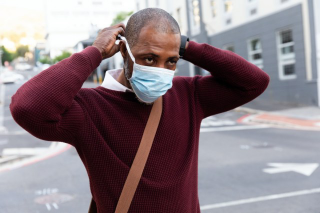What happens when two epidemics meet? The opioid epidemic has been one of the most growing public health emergencies in American history. As such, it wasn’t long before the top two public health emergencies met and created a bigger crisis.
According to provisional data from the Centers for Disease Control and Prevention (CDC) released in December last year, over 81 003 drug overdose deaths occurred in the United States in the 12 months ending in May 2020 with a 24% nationwide increase in mortality from overdoses – this was around the time when the strictest lockdown measures were in effect.
Additionally, there also seems to be racial disparities when it comes to the use and abuse of opioids.
“The highest increase in mortality from opioids, predominantly driven by fentanyl, is now among Black Americans,” said Dr. Nora Volkow, the National Institute on Drug Abuse director at a national addiction conference. Dr. Volkow also shared how the risk of dying from methamphetamine overdose is “12-fold higher among American Indians and Alaskan Natives than other groups.”
How has the COVID-19 pandemic affected the opioid crisis?
1. A disruption in the supply chain
Fentanyl is an opioid that has caused overdose deaths in the past. In 2018, it was responsible for over 30 000 deaths in the United States. Now, while the pandemic temporarily severed the production and the supply chains for fentanyl, during June of last year, the American Medical Association (AMA) reported that “The AMA is greatly concerned by an increasing number of reports from national, state and local media suggesting increases in opioid‐related mortality—particularly from illicitly manufactured fentanyl and fentanyl analogs. At least 30 states have reported increases in opioid‐related mortality”

Photo by engin akyurt on Unsplash
Due to the disruption in the supply chain, users may turn to unknown suppliers to get their fix. Unfortunately, these drug substitutes are often laced with unfamiliar ingredients – all of which could increase the risk for an overdose.
2. Interrupted treatment
The pandemic interrupted and stalled a lot of healthcare services as medical experts turned their attention to COVID.
“Many have relapsed due to closing of treatment agencies, loss of access to medications used to treat addictions, loss of job, loss of affordable housing, and unavailability of locations that offered support groups prior to the pandemic resulting in increased social isolation,” explained Dr. Michael Gordon, medical director for Atlanta-based addiction treatment facility The Berman Center, to Healthline.
While there has been a growth in telemedicine, many people find it difficult to connect over a screen.
3. Social isolation
Social distancing and stay-at-home orders may have helped flatten the curve. However, they could also have been the biggest contributor to overdose deaths. How so?
For one, anxiety and depression triggered by loneliness can lead to drug use.
“People can’t be around friends, go outside to gyms and restaurants, all of those everyday activities that might mitigate anxiety and depression,” explained Carla Marienfeld, a psychiatrist who directs the addiction recovery and treatment program at UC San Diego Health, to StatNews “Addiction thrives in secrecy and in the pandemic, you have more people alone and not accountable to friends and family.”
Secondly, if the rise in drug use leads to the person overdosing, there’s no one nearby to either administer the antidote naloxone or to go look for help.
4. Opioids and COVID Long Haulers
It appears that opioids may be playing a role when it comes to the management of COVID-19 symptoms.
Long haulers are patients who are still dealing with COVID symptoms 28 days or later after they were first diagnosed. According to a study published in Nature, for every 1000 long haulers who were being treated at a Veterans Affairs facility, doctors wrote nine more prescriptions for opioids than they otherwise would have. The study noted that many of the patients experienced significant muscle and bone pain.
Dr. Ziyad Al-Aly is the study’s lead author. He shared his concerns that even a small increase may lead to a resurgence of the prescription opioid crisis.
 “Physicians now are supposed to shy away from prescribing opioids,” said Dr. Al-Aly, “We must act now and ensure that people are getting the care they need. We do not want this to balloon into a suicide crisis or another opioid epidemic.”
“Physicians now are supposed to shy away from prescribing opioids,” said Dr. Al-Aly, “We must act now and ensure that people are getting the care they need. We do not want this to balloon into a suicide crisis or another opioid epidemic.”
Overmedicated
While the CDC does recommend alternatives to opioids (physical therapy, OTC anti-inflammatories), it’s clear that opioids have become the go-to for long-haulers.
Dr. Greg Martin is the president of the Society of Critical Care Medicine. According to him, many hospitalized COVID patients often receive a lot of medication to manage pain and anxiety. However, following the study’s findings, Dr. Martin is concerned that patients are unnecessarily continuing medication after leaving the hospital.
Dr. Al-Aly is concerned that the link between long haulers and opioids will continue to strengthen.
“That’s going to be a huge, significant burden on the health care system,” Al-Aly said. “Long covid will reverberate in the health system for years or even decades to come.”
Bottom line
We are still going to be reeling from the effects of the pandemic. However, it’s also important to know that addiction is not an easy disease. We need to offer support and let them know that they’re not alone.
References
Al-Aly, Z., Xie, Y. & Bowe, B. (2021). High-dimensional characterization of post-acute sequalae of COVID-19. Nature. https://doi.org/10.1038/s41586-021-03553-9
Manchikanti, L., Vanaparthy, R., Atluri, S., Sachdeva, H., Kaye, A. D., & Hirsch, J. A. (2021). COVID-19 and the Opioid Epidemic: Two Public Health Emergencies That Intersect With Chronic Pain. Pain and therapy, 1–18. Advance online publication. https://doi.org/10.1007/s40122-021-00243-2
Shelley, L. (2020), Fentanyl, COVID‐19, and Public Health. World Medical & Health Policy, 12: 390-397. https://doi.org/10.1002/wmh3.355







![women [longevity live]](https://longevitylive.com/wp-content/uploads/2020/01/photo-of-women-walking-down-the-street-1116984-100x100.jpg)










